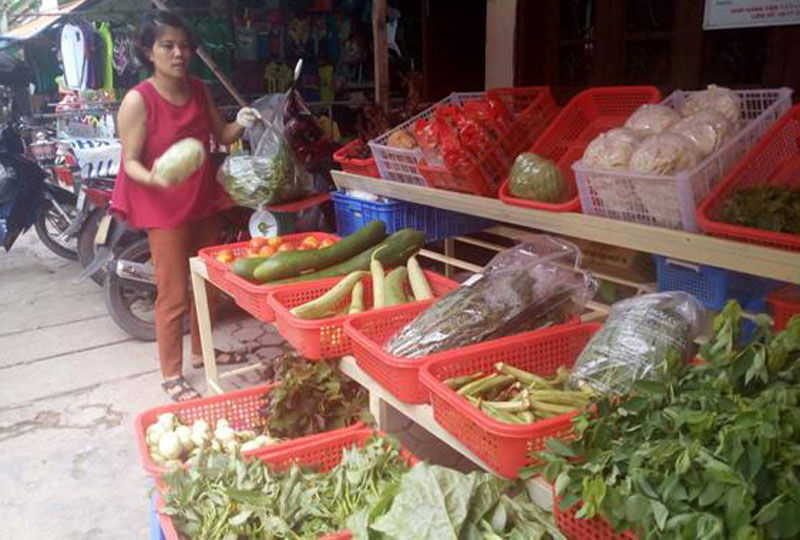
(HBO) – A store was recently opened at the area of former Phuong Lam market on Dien Bien Phu street, Hoa Binh city, selling clean fruits and vegetables with clear origins.
Food safety has long been a worry of each family, especially
housewives. Nguyen Thi Ha, a resident in Phuong Lam ward of Hoa Binh city, said
she often buy fruits and vegetables sold near the Phuong Lam market, but even
sellers do not know about the quality and safety of the goods since they just
re-sell the products purchased from other provinces.
At the Phuong Lam market, the origin of almost
all fresh agricultural products is unknown. Even when consumers know who
produced, it is also difficult to ensure that farmers complied with the safe
production process since they always consider profit as a top priority.

The store
selling products branded with "Hoa Binh Agricultural Products FTT” in the area
of former the Phuong Lam market (Hoa Binh city).
Due to consumers’ growing
demand and difficulties in selecting clean and safe foodstuffs, a group of
employees of the Hoa Binh sub-department of cultivation and plant protection
opened a store at No. 59, Dien Bien Phu street of Hoa Binh city, providing
clean fruits and vegetables branded "Nong san Hoa Binh FTT” (Hoa Binh
Agricultural Products FTT).
Many local residents were excited about the
inauguration of the store. Nguyen Thi Ha, a frequent customer, said: "Although
prices at the Hoa Binh Agricultural Products FTT are a little higher than those
of goods sold nearby, they are reasonable and accepted by consumers.”
Notably, there is a wide variety of carefully
selected products at the store such as water morning spinach, chayote buds,
basella alba, nalta jute, and mushroom. Most of the items hail from organic
farming areas or those following VietGAP standards such as the vegetable
production areas in Luong Son and Tan Lac districts (Hoa Binh province) or Moc
Chau district (Son La province).
With the initial farmland area of 2,000 sq.m. in
Dan Chu commune of Hoa Binh city, the store’s members have also produced different
types of quality and safe vegetables on their own.
Le Hoai
Nam, a co-founder of the store,
said the cultivation of all products sold there was closely monitored with farm
records and clear origins. Since the store’s opening, all vegetables and fruits
have continually been sold out shortly after they were put on the shelves.
With just over a month left until the school summer break, students are eagerly anticipating a period of rest and fun after a year of academic pressure. To provide a healthy environment for the physical development, in addition to the classes that foster talents and enhance the academic knowledge, sports and physical activities continue to attract a large number of children and teenagers.
On April 17th, Hoa Binh Provincial Museum organized a program to promote and introduce the outstanding values of "Hoa Binh Culture” at the Boarding Secondary and High School for ethnic minority students in Mai Chau District.
The Hoa Binh College of Technical Technology, in collaboration with the Hoa Binh Technical and Economic College and the provincial Association of Literature and Arts, hosted a gathering on April 15 to celebrate Laos’ traditional Bunpimay (New Year) Festival 2025 and debut the new book "Nguoi Muong o ban Don” (Muong people in Don village).
In the millennia-long history of national construction and safeguarding, people of all ethnic groups in Hoa Binh have been united and closely bound together to overcome all difficulties and challenges, standing alongside the entire Vietnamese people throughout the history of building and defending the country.
Living green is a healthy, positive, and sustainable lifestyle that not only helps protect
the environment and quality of life but also conserves natural resources and ecosystems.
Among the many ways to embrace this lifestyle, reducing plastic consumption is one of the most impactful.
The women's unions at all levels in Kim Boi district have been making significant contributions to the movement of building cultural life in the local community.
The movement helps improve rural look and the spiritual and material lives of local residents.



